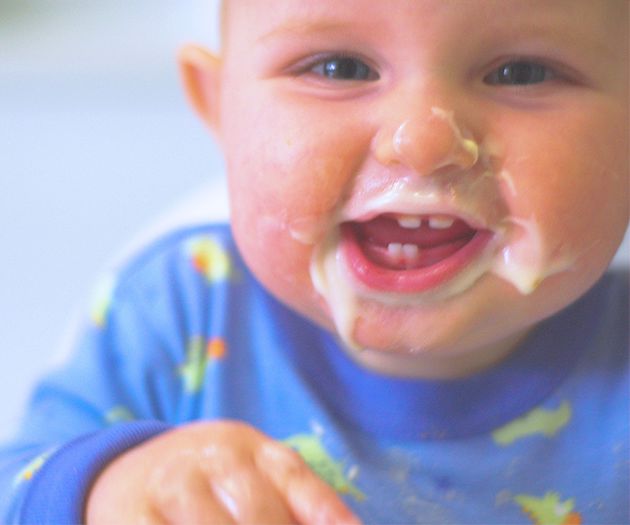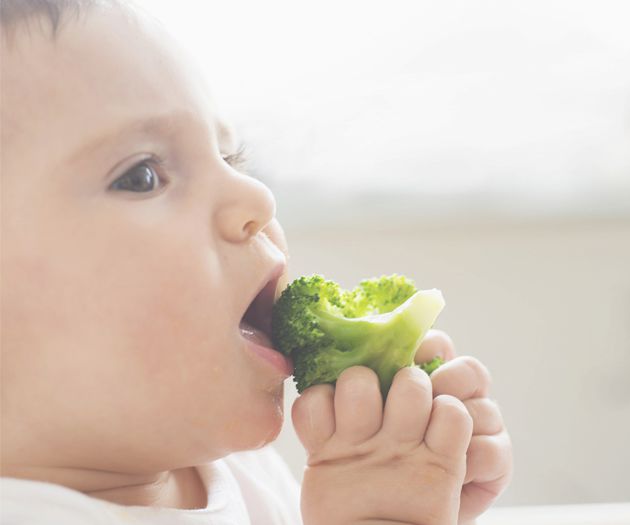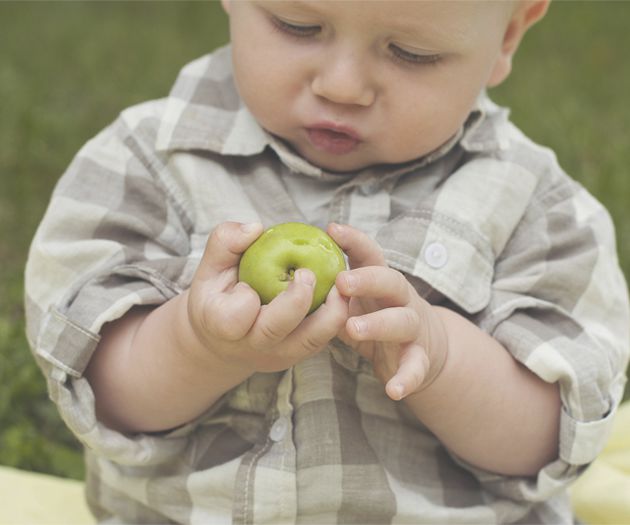At a glance
Babies have small tummies so need a high calorie, nutritionally rich diet
A varied weaning diet will help prevent your baby from becoming fussy
Meals for babies can be the same as the rest of the family’s to make life easier for everyone
Know exactly which foods still need to be avoided until your child is older
Download our new weaning guide to healthy eating for babies and toddlers
Download our new weaning guide from Aveen Bannon, registered Dietitian with over 20 years nutrition experience. This helpful weaning guide will take you through when to start weaning, all the stages of weaning, what nutrients are important in the weaning diet as well as weekly planners and recipes.
When it’s time for your baby to move on to solids, meals for babies packed full of nutrients will help them enjoy a healthy appetite and get used to different tastes. A balanced diet will provide the vitamins and minerals your baby needs to grow. They can eat the same food as you, just follow a few simple guidelines:
-
Limit fibre
Babies need lots of calories for growth but have small stomachs. Fibre is bulky and will fill them up leaving less room for more nutritionally-rich food
-
Don’t add salt or sugar
Separate your baby’s food from everyone else’s before adding any sugar or salt. Then blend, mash or chop your baby’s dinner so it’s easy to eat. And avoid salty foods like stock and gravy
-
Offer a range of different foods
This will help them get the nutrients they need and may avoid them being a fussy eater later on
-
Fat is important
Healthy sources of fat provide energy, so always give your baby full fat dairy products
What is a balanced diet for babies and toddlers?
Your baby’s weaning diet should include the five major food groups – fruits and vegetables, bread and starchy foods, dairy, meat and proteins, and fats and sugars. Contained in each of these food groups is everything that’ll meet the dietary needs for baby, and here’s why:
-
Protein
Helps form the building blocks for cells, muscles, bones, brain and more. Good sources include: Meat, fish, eggs and dairy products, pulses, nuts, seeds and fruits
-
Vitamin D
Helps the body absorb calcium to keep bones healthy, supporting your baby’s rapid growth, co-ordination and development. Good sources include: Eggs, oily fish (such as salmon and sardines) and vitamin supplements
-
Vitamin A
Helps strengthen your baby’s immune system and develops their vision. It also helps maintain healthy skin. Good sources include: Dairy products including butter, red and yellow vegetables and fruits with beta-carotene, spinach, cabbage, kale and broccoli
-
Vitamin C
Essential for your baby's general health and immune system. It also helps their little body absorb iron, so try to include it at every meal. Good sources include: Citrus fruit, kiwi fruit and strawberries, broccoli, tomatoes and peppers
-
Iron
Helps to carry oxygen around your baby’s body, keeping them healthy and their brain active. Good sources include: Red meat and fish, egg yolk, beans and lentils, fortified breakfast cereals, leafy, dark-green vegetables
-
Omega 3 and 6
These fatty acids are important for the healthy development of your baby’s brain, eye and nervous system. Good sources include: Oily fish (such as salmon, sardines, mackerel or fresh tuna), eggs, leafy, dark-green vegetables
-
Calcium
Ideal for building strong bones and teeth, regulating muscle contractions including heartbeat, and ensuring that blood clots normally. Good sources include: Yogurt, cheese and other dairy foods. Check about food intolerances before you wean with any of the above foods
SMA® PRO Follow-on Milk is a good choice as it compliments the weaning diet.
Foods to avoid for baby
- Cows' milk can be added to food but should not be given to your baby as a drink for their first 12 months
- Peanuts are fine once your baby is six months old as long as there’s no history of allergies, but not too much and only as a smooth spread as they can be claggy
- Whole nuts are a choking hazard so should be avoided under the age of five, though chopped nuts are fine
- Honey may contain bacteria that can lead to infant botulism, as well as being a sugar, so avoid until your baby’s first birthday
- Raw eggs should be cooked until the yolk and white are solid to kill any bacteria
- Pâté, raw shellfish and mould-ripened or unpasteurised cheeses carry a small risk of food poisoning so are not suitable under the age of two
- Unprocessed bran prevents other nutrients being absorbed, so avoid until your child is five years old
- Shark, swordfish and marlin contain high levels of mercury that can affect your baby’s nervous system
IMPORTANT NOTICE: The best way to feed a baby is to breastfeed, as breast milk provides the ideal balanced diet and protection against illness for your baby and also many non-nutritional benefits for both baby and mother. We recommend that you speak to your healthcare professional when deciding on your choice of feeding your baby. Professional guidance should also be sought on the preparation for and maintenance of breastfeeding. If you do choose to breastfeed, it's important to eat a healthy, balanced diet. Infant formula is intended to replace breast milk when mothers choose not to breastfeed or if for some reason they are unable to do so. A decision not to breastfeed, or to introduce partial bottle-feeding, will reduce the supply of breast milk. If for any reason you choose not to breastfeed, do remember that such a decision can be difficult to reverse. SMA® PRO Follow-on Milk is only suitable for babies over 6 months as part of a mixed diet. It should not be used as a substitute for breast milk during the first 6 months. The decision to start weaning or to use this product before 6 months, should be made only on the advice of a doctor, midwife, health visitor, public health nurse, dietitian or pharmacist, based on baby’s individual needs.









